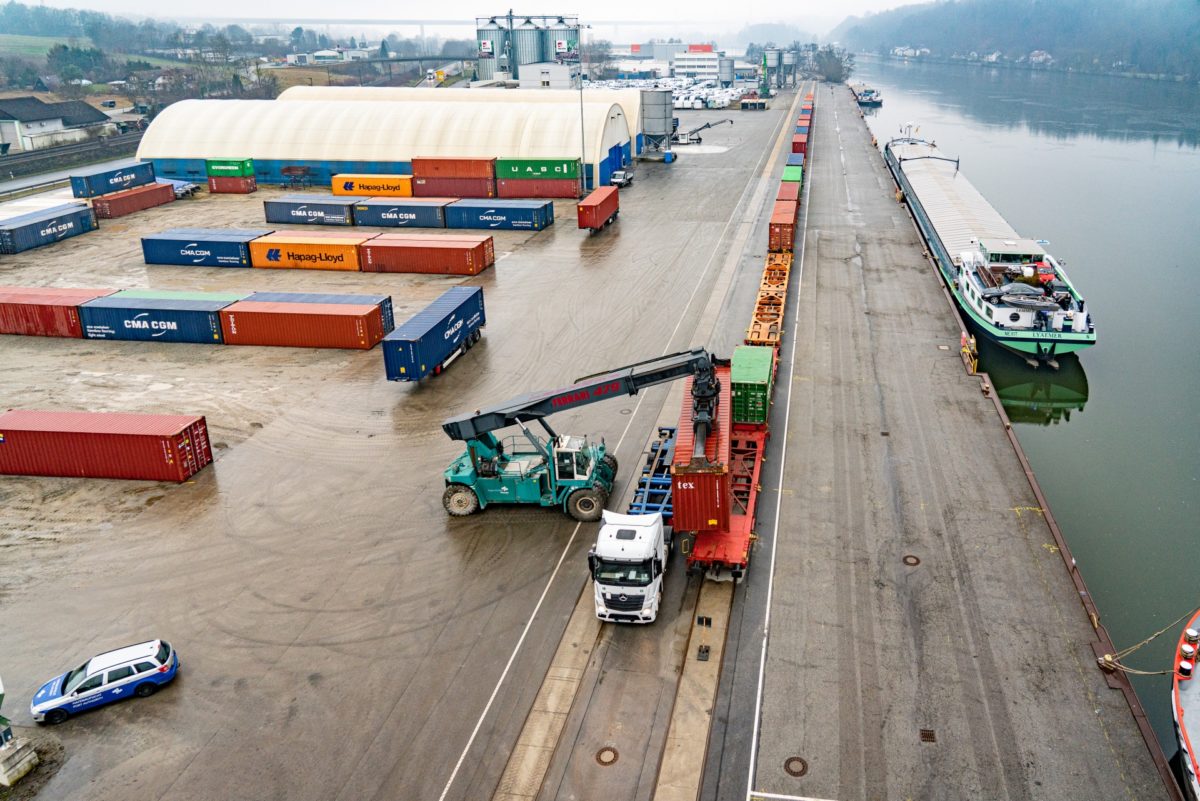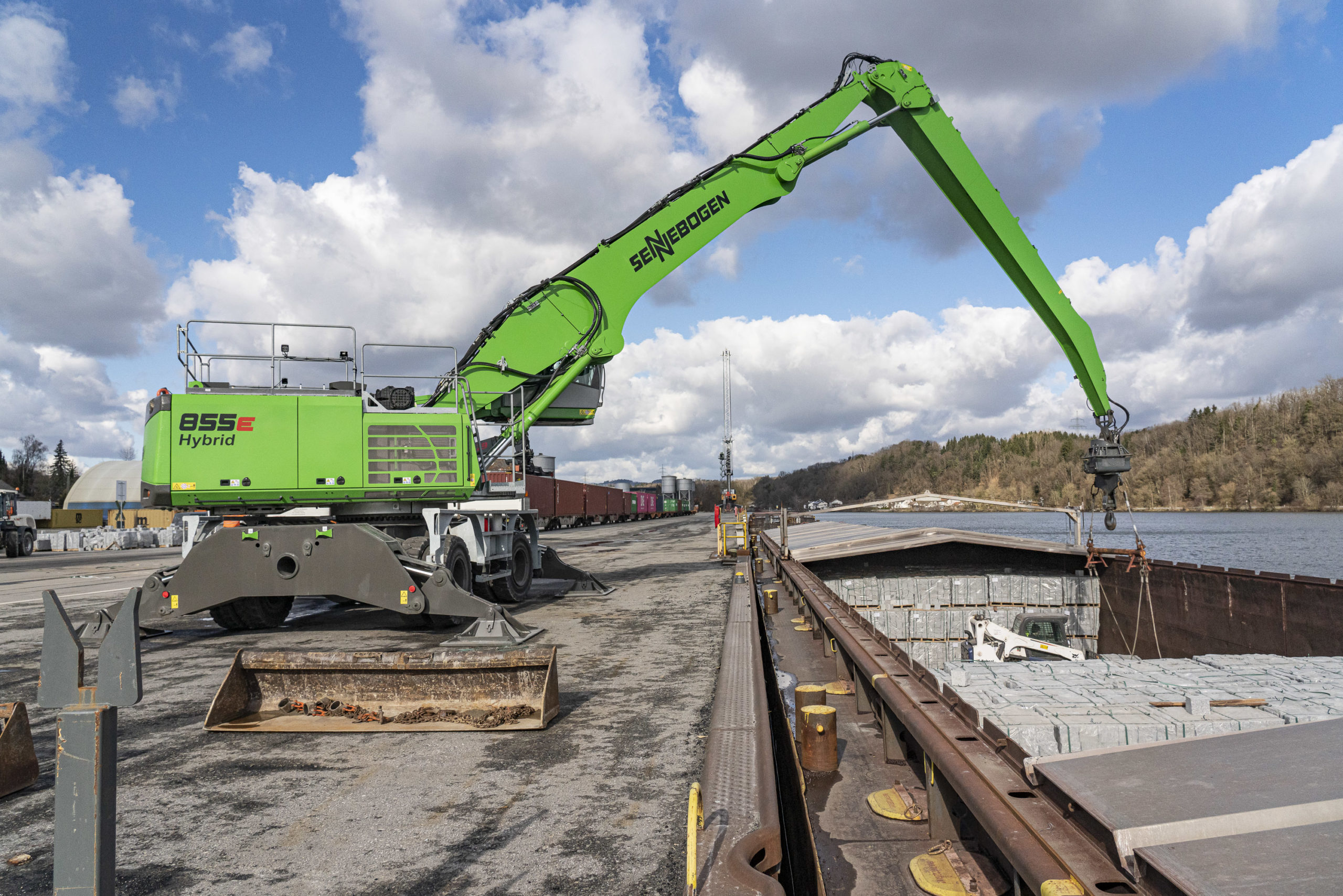22 March 2023 | Passau
bayernhafen Passau remains the backbone for the supply of goods to society and industry in the region in 2022
2022 financial year: 278,138 tonnes of goods moved by inland waterway and rail; rail freight handling holds level; river cruises recover; bayernhafen invests around €2.5 million.

Rail freight handling proved to be robust in 2022, with 103,051 tonnes in 2022, the same as in the previous year. A significant contribution to this was made by the positive development in combined transport. (Image source: bayernhafen Passau / M. Ziegler)
Passau, 21 March 2023 – Despite 2022 being a difficult year, bayernhafen Passau showed what it was capable of, with 278,138 tonnes of goods moved by inland waterway and rail. This amounted to a saving of over 16,000 truck journeys through the shifting of long-distance traffic to the more environmentally friendly transport modes of inland waterways and rail. bayernhafen handled a total of almost 9 million tonnes of goods across its six locations in Aschaffenburg, Bamberg, Nuremberg, Roth, Regensburg and Passau.
In 2022, 175,087 tonnes of goods were moved by inland waterway at Passau, 14.8% less than in the previous year. This was caused by a decrease in the handling of road salt due to the mild, low-snow winter of 2021/22. The handling of maize also fell as a result of the poor harvest in the hot and dry summer of 2022. A lack of freight capacity was also felt as shipping capacity was tied up with coal transports on the Rhine and grain transports from Ukraine on the Danube. Agricultural goods accounted for the lion’s share of shipping tonnage at Passau, followed by construction materials, minerals and ores. Heavy-lift/large-volume transport also continued to play a major role at the Passau-Schalding location. The same was true of ro-ro transport, which links Passau via Enns to Vidin and Ruse in Bulgaria. Rail freight transhipment proved to be robust, with 103,051 tonnes in 2022, the same as the previous year (-0.1%). A significant contribution to this was made by the positive development in combined transport. Since February 2021, a daily container train service has been in operation between bayernhafen Passau and the German seaports of Hamburg, Bremerhaven, Bremen and Wilhelmshaven. In 2022, container throughput amounted to 5,497 TEU (twenty foot equivalent unit = standard container unit), an increase of 87%. The container train service is used by companies in the region to export their products, for example from the automotive sector, and to import intermediate products and commercial goods. Cement continues to be an important rail transshipment commodity in Passau.
Despite the challenges, however, we are seeing considerable interest and a fundamental willingness to expedite the change to inland waterway and rail for transport, not only among our customers but also among companies in Bavaria.
Joachim Zimmernann,
Chief Executive Officer of bayernhafen
“Despite the challenges, however, we are seeing considerable interest and a fundamental willingness to expedite the change to inland waterway and rail for transport, not only among our customers but also among companies in Bavaria. We act as the backbone for the supply of goods to society and industry,” Says Joachim Zimmermann, the Chief Executive Officer of bayernhafen. To ensure that bayernhafen remains the first port of call, we will continue to invest in our infrastructure.”
Targeted investment in the development of Schalding and Racklau
In 2022, bayernhafen initiated a €2.5 million investment programme at the Passau location in the redevelopment of its port infrastructure. This includes the construction of a warehouse and garage building in Schalding and the procurement of a wheel loader.
The expansion of the river cruise infrastructure in Racklau has also continued. This is being carried out in close coordination with the city of Passau, which has planning authority. Currently, the berths are being equipped with a shore power system with six charging points for river cruise ships. The draft planning has been completed and the approval process is currently underway. bayernhafen is meeting the investment costs for supplying shore power, with the Free State of Bavaria and the federal government contributing a total of almost €1 million in federal financial aid. While at berth, the cruise ships will then be able to switch off their diesel generators, which will reduce CO2 and particulate matter emissions, among other things.
It is in bayernhafen’s interest to develop the areas in Racklau intelligently and sustainably. In doing so, we pay particular attention to ensuring that there are no restrictions on the infrastructure for shipping.
Carsten Conrad
Branch Manager of bayernhafen Passau
We will also be upgrading and significantly improving the water-side infrastructure for the water rescue, fire brigade and water police organisations that have long been based at Racklau. Preparations for this are underway and are being coordinated with the city and the relevant stakeholders.
“It is in bayernhafen’s interest to develop the areas in Racklau intelligently and sustainably. We are fundamentally open to considerations that are feasible and compatible with port operations. In doing so, we pay particular attention to ensuring that there are no restrictions on the infrastructure for shipping,” says Branch Manager, Carsten Conrad. “Furthermore, all plans and ideas must take into account the fact that Racklau is located in area designated as floodplain.”
For 2023, bayernhafen is planning to instigate investments of over €420,000 in Passau, such as in the energy-efficient modernisation of two office buildings at bayernhafen Passau-Schalding.
Recovery in river cruise sector
The river cruise sector saw a recovery in 2022. In 2022, 314 river cruise ships called in at bayernhafen Passau, 25.6% more than in 2021 and the first time this figure had exceeded 300 ships. Due to the low water levels, many river cruise ships were unable to pass the still undeveloped section of the Danube between Straubing and Vilshofen, meaning that passengers were transported by bus between Regensburg and Passau.

2022 tonnes of goods were moved by inland waterway at Passau. Agricultural goods accounted for the lion’s share of shipping tonnage in Passau, followed by construction materials, minerals and ores. (Image attribution: bayernhafen Passau / M. Ziegler)
